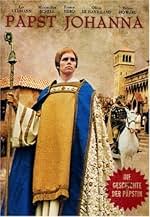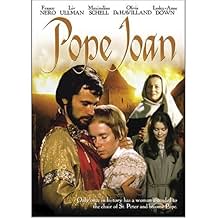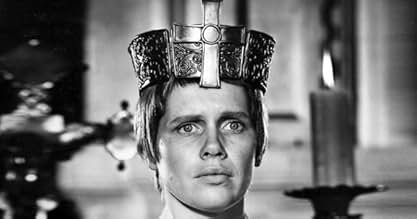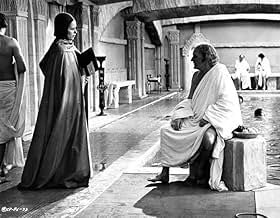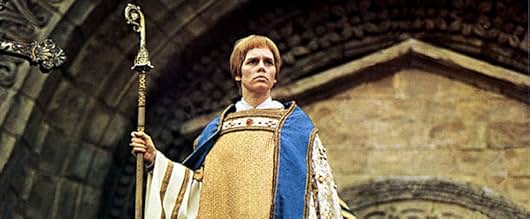In medieval Europe, a pious young woman becomes a scholar of theology, disguises herself as a man, rises through the Catholic Church hierarchy and is elected Pope.In medieval Europe, a pious young woman becomes a scholar of theology, disguises herself as a man, rises through the Catholic Church hierarchy and is elected Pope.In medieval Europe, a pious young woman becomes a scholar of theology, disguises herself as a man, rises through the Catholic Church hierarchy and is elected Pope.
- Director
- Writer
- All cast & crew
- Production, box office & more at IMDbPro
Featured reviews
I found the film version of the Pope Joan story compelling viewing because it conveyed the force and importance of Joan's spiritual calling yet portrayed her as an breathing human being (this may be somewhat ironic since it is possible she is only a legend). Here is a woman who hears God's voice and the voice of carnal longing. She is neither the lowly whore nor the ethereal virgin. Also, it is refreshing to see films where spirituality and belief in God are taken seriously.
I found the performances to be excellent, especially those of Liv Ullman and Trevor Howard. Ullman is very good at portraying the vertical pull of spirituality and the wrenching ambiguity of living in the material world. Trevor Howard's performance was utterly convincing. Also, Susan Winter had a quiet presence about her in her brief performance as the young Joan, which impressed me. What a tenuous thing to be a young girl in the Medieval age - what a microcosm she is of all human existence.
This film has its flaws, most notably the disjointed editing and jarred pacing. I do not quibble, however, with the less than ideal sound quality of the dialog or the occasional white lines which momentarily appear on the screen now and again because when I watch a film, I accept the film on its own terms; I do not wish it was something it isn't - a film made on a modest budget in 1972 should not be expected to look and sound like a mega-budget blockbuster filmed in 2006. On the whole, this movie is a success.
Cautionary note: not a movie for kids.
I found the performances to be excellent, especially those of Liv Ullman and Trevor Howard. Ullman is very good at portraying the vertical pull of spirituality and the wrenching ambiguity of living in the material world. Trevor Howard's performance was utterly convincing. Also, Susan Winter had a quiet presence about her in her brief performance as the young Joan, which impressed me. What a tenuous thing to be a young girl in the Medieval age - what a microcosm she is of all human existence.
This film has its flaws, most notably the disjointed editing and jarred pacing. I do not quibble, however, with the less than ideal sound quality of the dialog or the occasional white lines which momentarily appear on the screen now and again because when I watch a film, I accept the film on its own terms; I do not wish it was something it isn't - a film made on a modest budget in 1972 should not be expected to look and sound like a mega-budget blockbuster filmed in 2006. On the whole, this movie is a success.
Cautionary note: not a movie for kids.
"What a surprise! Not only the story, but what a cast! Liv Ullmann, Trevor Howard, Olivia de Havilland, Maximilian Schell, Franco Nero, Leslie Ann Down! And the texture of the movie - the crude medieval villages, the halls of the ancient Vatican, the incredible 10th Century nunnery, the countryside of Saxon Germany, in peace and war, scene after scene that could never have been shot in Hollywood. But the greatest discovery is the performance of Liv Ullmann. If anything ever deserved an Academy Award. She creates more passion and sexual desire with her eyes and the movement of a hand than the whole pantheon of current sex goddesses could with all their bodies and a ravishing musical score behind them. And when it comes to tragedy and fear those same eyes dig so deeply into the soul they leave a mark that haunts you for weeks. This is a wonderful, wonderful picture."
The early 1970's was my favourite period in recent cinema history, classics such as Kubrick's Clockwork Orange, Skolimowsky's Deep End and Visconti's Death in Venice abound; but there are some, less than ringing endorsements of the era, this half-forgotten movie being one.
Liv Ullman, the embodiment of Scandinavian sang-froid, the epitome of ephemeral solemnity, plays Joan, a pious and youthful nun, who travels from a medieval convent, burnt down by Saxons, raping and pillaging, as if they misconstrued it for a set on a Ken Russell film, to Rome where disguised as a (rather attractive) young man, she wins her spurs, becomes a cardinal and eventually the first - and possibly last - female pope.
The trouble is, although Liv's performance is full of meaning and her fights against the alleged sin of lust, particularly enthralling, the editing, jumpiness and preposterousness of some scenes, leave an anxious viewer in need of redemption elsewhere.
True, it is interesting to see actors of the time - Lesley Anne Down, Maximillian Schell, Trevor Howard and Olivia de Havilland - giving robust performances, but a sandwich with an attractive filling is hardly worth eating if the bread is stale. And this is a stale mish mash, which ultimately fails to satisfy. It is a shame. The theme is interesting, whether the story is true or not. Given the current arguments amongst many religions on the role of women, it has significance for us in the 21st Century.
The scenery around Brasov, Romania, where it was filmed, which I visited post Ceausescu, is exemplary. Mind you, maybe the reason for the film's disjointed nature is just that - that the dictator, in his first flush of dictatorial youth, was in charge of production. There again, maybe Ceausescu was a woman. Now that would be a tale worth telling...
Liv Ullman, the embodiment of Scandinavian sang-froid, the epitome of ephemeral solemnity, plays Joan, a pious and youthful nun, who travels from a medieval convent, burnt down by Saxons, raping and pillaging, as if they misconstrued it for a set on a Ken Russell film, to Rome where disguised as a (rather attractive) young man, she wins her spurs, becomes a cardinal and eventually the first - and possibly last - female pope.
The trouble is, although Liv's performance is full of meaning and her fights against the alleged sin of lust, particularly enthralling, the editing, jumpiness and preposterousness of some scenes, leave an anxious viewer in need of redemption elsewhere.
True, it is interesting to see actors of the time - Lesley Anne Down, Maximillian Schell, Trevor Howard and Olivia de Havilland - giving robust performances, but a sandwich with an attractive filling is hardly worth eating if the bread is stale. And this is a stale mish mash, which ultimately fails to satisfy. It is a shame. The theme is interesting, whether the story is true or not. Given the current arguments amongst many religions on the role of women, it has significance for us in the 21st Century.
The scenery around Brasov, Romania, where it was filmed, which I visited post Ceausescu, is exemplary. Mind you, maybe the reason for the film's disjointed nature is just that - that the dictator, in his first flush of dictatorial youth, was in charge of production. There again, maybe Ceausescu was a woman. Now that would be a tale worth telling...
I saw the film on TV, quite by chance. I found the film gripping: the story, the atmosphere and the historical detail.
I have no religious interest, but it made me curious to find out more about 'pope Joan'. The film is a work of fiction based on a legend, with very little factual basis.
Nevertheless, one could really get a sense of life in those times (9th century Europe). Poverty, illiteracy, corruption. The place of women. The violence, that life was worth very little.
Sadly, I think much of the world is just like that today, so perhaps it is a little window on humanity.
I have no religious interest, but it made me curious to find out more about 'pope Joan'. The film is a work of fiction based on a legend, with very little factual basis.
Nevertheless, one could really get a sense of life in those times (9th century Europe). Poverty, illiteracy, corruption. The place of women. The violence, that life was worth very little.
Sadly, I think much of the world is just like that today, so perhaps it is a little window on humanity.
A persistent rumor which has lasted for centuries is that there once was a Pope who was secretly a woman and she was later dubbed 'Pope Joan". There is no evidence to support the 13th century rumors about this 9th century 'Pope'...but with rumors and conspiracy theories this isn't surprising that it persists. One reviewer even praised it for its historical accuracy...not realizing it was fiction. What also isn't surprising is that the notion of a lady Pope resulted in several movies about this supposed woman...I counted at least four as well as a musical.
I should point out that there are two versions of the movie. One is the original one which met with little success in theaters as well as a truncated version which elminated some of the flashback scenes. Sadly, the only version I could find was the truncated version...though the re-edited version was called "The Devil's Imposter" when it was later released...and this one DID bear the title "Pope Joan"...even though about 30 minutes of the original movie is missing.
So, if I ignore that the film is based on a myth and the version I saw was truncated, was it still worth watching? Well, maybe. You should be warned that the film is pretty depressing and war, death and the like are the sorts of things you'll see in the film. Additionally, the rape and masturbation scenes were handled poorly...being vague and confusing more than anything else. It also was VERY earnest...perhaps too much so. These all turned me off and I thought that at least a myth could be more fun to watch.
I should point out that there are two versions of the movie. One is the original one which met with little success in theaters as well as a truncated version which elminated some of the flashback scenes. Sadly, the only version I could find was the truncated version...though the re-edited version was called "The Devil's Imposter" when it was later released...and this one DID bear the title "Pope Joan"...even though about 30 minutes of the original movie is missing.
So, if I ignore that the film is based on a myth and the version I saw was truncated, was it still worth watching? Well, maybe. You should be warned that the film is pretty depressing and war, death and the like are the sorts of things you'll see in the film. Additionally, the rape and masturbation scenes were handled poorly...being vague and confusing more than anything else. It also was VERY earnest...perhaps too much so. These all turned me off and I thought that at least a myth could be more fun to watch.
Did you know
- TriviaAfter a muted critical response, the film was severely re-edited. In its original incarnation, the film contained many flashbacks and flash-forwards, quite a progressive style for 1972. These were all removed to create a more linear story and the film was then released as "The Devil's Imposter". These changes were reinstated for a 2009 reissue.
- Alternate versionsIn the version shown on BBC TV on 22nd October 2005, the 20th-century bookend scenes are cut, Keir Dullea and Robert Beatty do not appear, and the film ends abruptly with the crowd descending on Joan.
- ConnectionsFeatured in A Quiet Revolution (1972)
- How long is Pope Joan?Powered by Alexa
Details
- Release date
- Country of origin
- Language
- Also known as
- The Devil's Imposter
- Filming locations
- Brasov, Romania(mountain top castle scenes)
- Production companies
- See more company credits at IMDbPro
- Runtime
- 2h 12m(132 min)
- Sound mix
- Aspect ratio
- 2.35 : 1
Contribute to this page
Suggest an edit or add missing content

